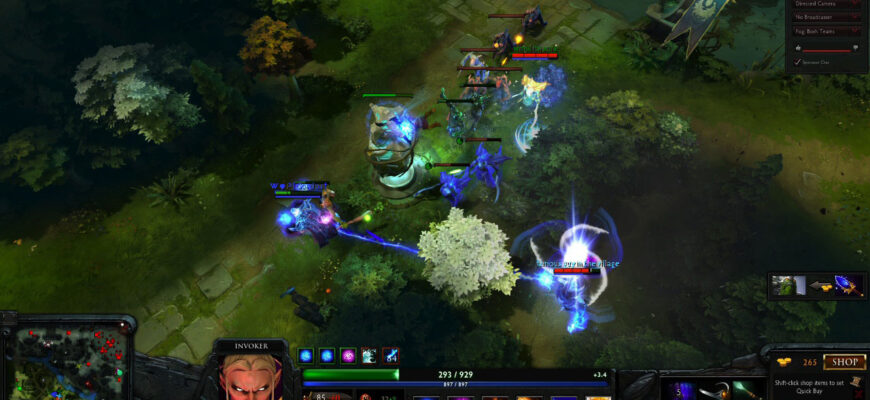In the ever-evolving landscape of competitive gaming, few titles evoke as much passion and debate as Dota 2. A titan of the MOBA genre, it has undergone countless transformations, each patch altering the meta and challenging player perceptions. Recently, veteran streamer and commentator Alexander “Nix” Levin ignited a familiar discussion, articulating a sentiment shared by many long-time players: the game, he argues, has lost its soul, transitioning from a stage for individual brilliance to an overwhelmingly team-dependent endeavor.
The Golden Age of Solo Domination
Nix`s critique isn`t merely a casual complaint; it stems from a deep, nostalgic appreciation for what Dota 2 once was. He fondly recalls a time when individual skill could decisively turn the tide of battle, a period characterized by the thrill of securing solo kills and the power fantasy of high-damage, burst-oriented heroes. Figures like Puck, Queen of Pain, Ember Spirit, Storm Spirit, Phantom Assassin, Morphling, and the venerable old Faceless Void and Terrorblade were his champions, avatars of destruction capable of single-handedly dismantling enemy formations.
He paints a vivid picture of the Anti-Mage player of yesteryear: a master of split-pushing, map awareness, and evasion. Such a player, with superior game understanding and intricate movement, could genuinely win a 1v5 scenario. Regardless of how poorly teammates performed their lanes, a skilled Anti-Mage could farm relentlessly, reaching critical item timings like a Butterfly, then engage in audacious base races. This forced panicked enemy Teleports, which the Anti-Mage would skillfully dodge, only to return and punish isolated stragglers. The ultimate sequence: push lanes, secure Aegis, and claim victory. For Nix, this era was Dota 2`s “masterpiece,” a testament to the potential for personal impact.
The Shifting Sands: When did the Game Change?
According to Nix, a discernible shift occurred following the departure of IceFrog and his core team. What followed, he posits, was an era of increasing “equalization” among characters. Heroes, once distinct in their power spikes and niche capabilities, began to blur. Carries, in particular, saw their roles redefined. Nix points to examples like Abaddon, Faceless Void frequently building Helm of the Dominator, or Dragon Knight opting for utility items such as Blink Dagger, Mage Slayer, and Force Staff. This trend, he argues, stripped away the very elements he cherished most about the game.
The mid-lane, once a crucible for individual duels, has similarly transformed. Nix laments the current inability to secure solo kills, citing heroes` inflated health pools and the resilience of supports. “You physically cannot kill a hero without your team,” he states, a stark contrast to the days when a high-skill Rubick mid could leverage raw mechanical prowess and intelligent itemization (Dagon, Blink Dagger, Eul`s Scepter) to outplay and snowball, carrying the game with audacious highlights.
The Rise of Team Coordination (and the Fall of Solo Heroics)
Dota 2, Nix concludes, has become “maximally team-oriented.” The dream of winning a game through sheer individual brilliance, even on lower MMR brackets, is now largely unattainable. Even if he were to dominate every opponent in a lobby, he`d still be forced to pick “broken” (meta-defining, often imbalanced) heroes to stand a chance. This forced meta adherence extends even to casual modes like Turbo, where the pursuit of fun is often overshadowed by the necessity to play optimally to secure a win. The irony, of course, is that a game often lauded for its strategic depth might, in its pursuit of balance, inadvertently stifle the very avenues of personal expression that once drew players in.
While Nix acknowledges that competitive matches among top-tier players remain captivating, he`s quick to point out the crucial difference: these professionals operate within a highly coordinated system, supported by four equally skilled teammates. This environment is far removed from the solo queue experience where individual players often feel helpless against a less cohesive unit.
Reflecting on Evolution: Inevitable or Ill-Conceived?
Nix`s perspective offers a potent commentary on the ongoing evolution of Dota 2. Is this shift towards greater team dependency an inevitable outcome of a maturing game striving for balance and complexity? Or does it represent a fundamental departure from the game`s core appeal for a segment of its veteran players? The debate continues to rage, echoing through Reddit threads, forum posts, and Twitch chats. While the competitive scene may thrive on intricate team strategies, the casual player, yearning for those moments of individual heroism, might find themselves increasingly alienated from a game that once felt like a personal masterpiece.
As Dota 2 continues its journey, balancing the demands of competitive integrity with the desire for engaging individual play remains a delicate act. Nix`s insights serve as a poignant reminder that for every step forward in game design, there might be a cherished aspect left behind.









